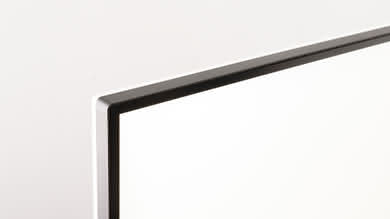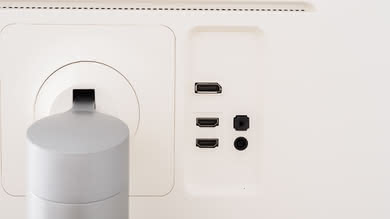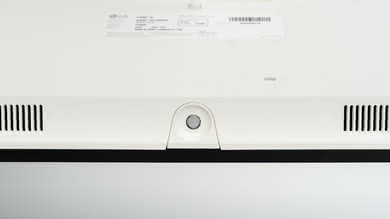Our Verdict
The LG 27UK650-W is a good monitor and will please you in most usages. It has wide viewing angles and the large screen gives you more space to work on. Also, the high resolution allows you to see small details. The monitor has HDR support but it fails to display a wide color gamut.
- Excellent resolution and size allow for multitasking.
- Input lag is very low.
- Wide viewing angles.
- Lacking HDR performance.
- No local dimming support.
The 27UK650-W is a very good monitor for office use. The 27 inch screen offers plenty of space for multitasking, and the 4k resolution allows you to see images clearly. It has great viewing angles, so the image will appear accurate when viewed from the side. Unfortunately, it has disappointing ergonomics, and you'll need to move the entire monitor if you want to adjust your screen to the side.
Good monitor for gaming. The 27UK650-W has an excellent low input lag and a fast response time. It comes equipped with FreeSync variable refresh rate technology to help reduce tearing in games, but it doesn't include a black frame insertion feature to reduce motion blur.
The LG 27UK650-W is a good monitor for multimedia usage. Its high resolution and large size give you more than enough screen space and will display small details. It can get very bright so you can enjoy streaming in brighter rooms, but you should avoid very dark rooms as the mediocre contrast makes blacks appear gray. Finally, it has great viewing angles, which are good if multiple people are watching.
This is a very good monitor for media creation. The large screen and high resolution make it easy to open multiple windows. It has very accurate and vivid colors, but the Adobe RGB color space coverage is limited, and this might affect those who want to use it for photo editing.
Decent monitor for HDR gaming. The 27UK650-W can't display a wide color gamut and fails to bring out highlights. On the upside, it has a very low input lag and fast-moving images look clear. Unfortunately, the contrast ratio makes blacks look gray and the 60Hz refresh rate might disappoint some hardcore gamers.
Changelog
- Updated Jan 20, 2021: For consistency, we've changed the swivel adjustment from N/A to 'No'. The score remains unchanged.
- Updated Feb 17, 2020: Converted to Test Bench 1.1.
- Updated Jan 17, 2019: We tested the monitor's compatibility with NVIDIA's new FreeSync driver. See our full investigation into NVIDIA's FreeSync Drivers here.
- Updated Aug 17, 2018: Review published.
Check Price
Differences Between Sizes And Variants
We tested the white variant of the 27 inch model (27UK650-W). The model we reviewed was manufactured in April 2018 and you can see the label here.
In some regions, LG sells the 27UK600 instead of the 27UK650. We don't know for sure what differences there are, but it appears to offer very similar performance to the 27UK650, but with a fixed stand that can only tilt.
If someone comes across a different type of panel or if their 27UK650 doesn't correspond to our review, let us know and we will update the review. Note that some tests such as the gray uniformity may vary between individual units.
| Model | Size | Refresh rate | Notes |
|---|---|---|---|
| 24UD58-B | 24" | 60Hz | |
| 27UD58-B | 27" | 60Hz | |
| 27UD68P-B | 27" | 60Hz | Black variant |
| 27UD68P-W | 27" | 60Hz | White variant |
| 27UK650-W | 27" | 60Hz | White variant |
| 27UK600-W | 27" | 60Hz | White variant |
Popular Monitor Comparisons
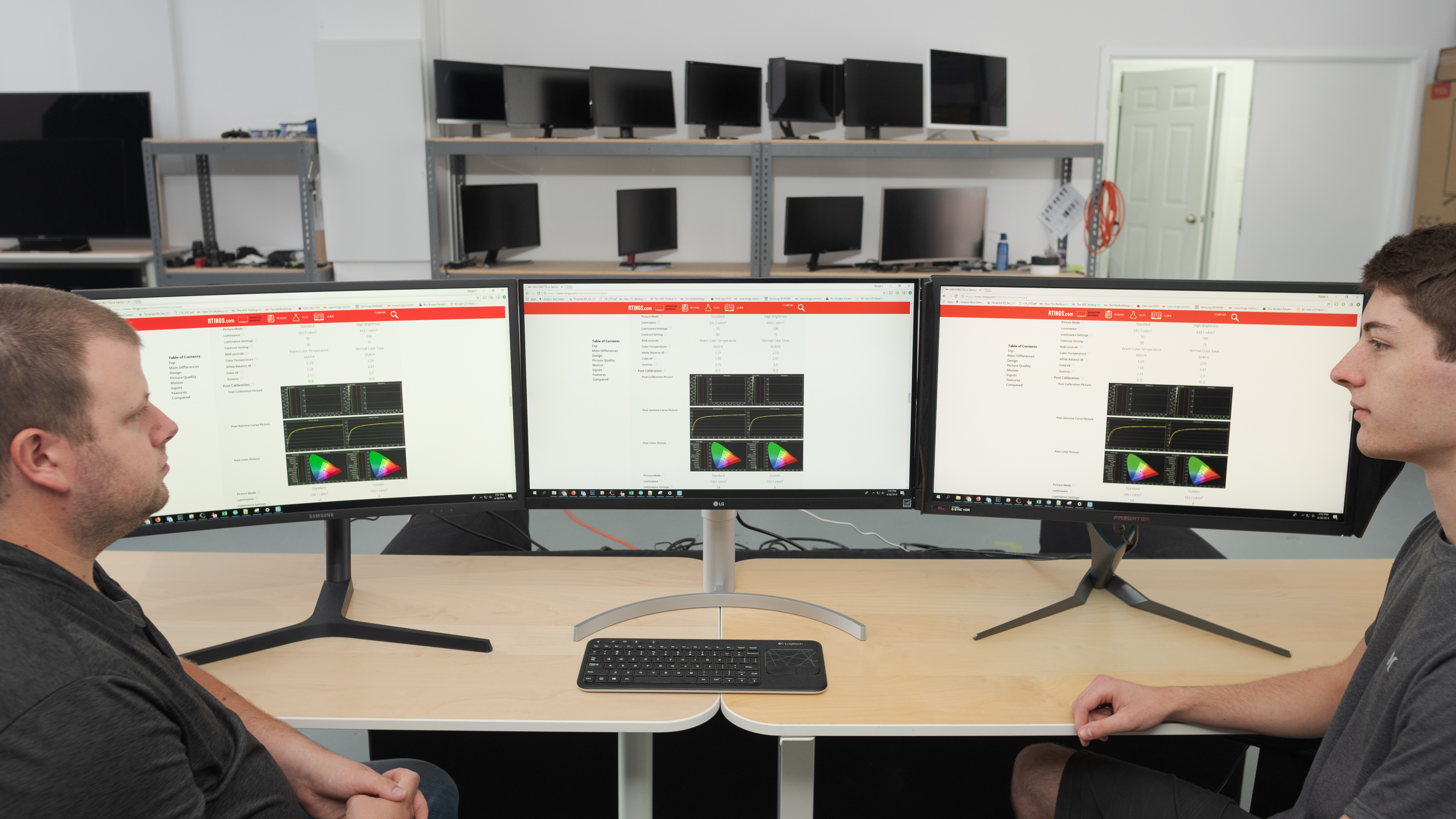
The LG 27UK650 is a 4K monitor with an IPS screen and FreeSync support, and one of the best 4k monitors we've tested so far. See also our recommendations for the best monitors for dual setup, the best gaming monitors and the best 4k HDR monitors.
Overall, the Dell S2721QS is a bit better than the LG 27UK650-W. The Dell has better ergonomics, wider viewing angles, and better reflection handling. On the other hand, the LG has better out-of-the-box color accuracy.
The Dell U2720Q and the LG 27UK650-W have very similar performance overall. The LG has a faster response time, better color accuracy, and it supports FreeSync. The LG also has better gradient handling. On the other hand, the Dell has a better build quality, better ergonomics, and it gets much brighter in HDR content.
Overall, the ASUS ROG Swift PG279QZ and the LG 27UK650-W are very similar, but the PG279QZ is a much better gaming monitor. The PG279QZ has a faster refresh rate, resulting in much clearer motion, and it has an optional black frame insertion feature to further clear up any blur. The LG 27UK650-W, on the other hand, has a higher native resolution and is slightly better for multitasking.
The LG 32UL500-W and the LG 27UK650-W are both 4k monitors with a 60Hz panel, but the 32UL500-W has a 32-inch VA panel while the 27UK650-W has a 27-inch IPS panel. The 27UK650-W is better overall because it has wide viewing angles, better ergonomics, and gets much brighter to combat glare. It also has a better response time if you want to game. However, the 32UL500-W provides more screen real estate, and content creators might prefer its wider Adobe RGB and DCI P3 coverage.
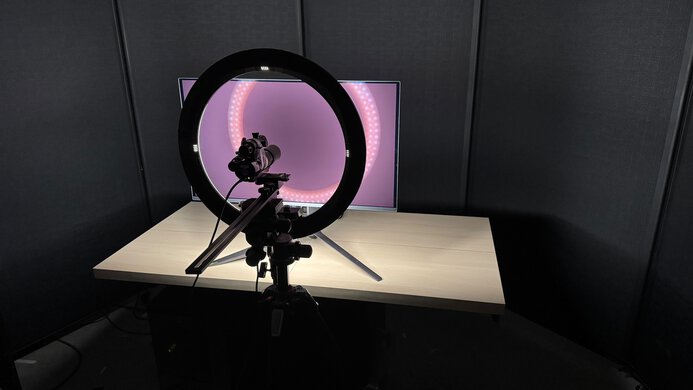
We buy and test more than 30 monitors each year, all of which we purchase ourselves, without cherry-picked units or samples. We put a lot into each unbiased, straight-to-the-point review, and there's a whole process from purchasing to publishing, involving multiple teams and people. We do more than just use the monitor for a week; we use specialized, custom tools to measure various aspects and deliver objective, data-driven results. We also consider multiple factors before making any recommendations, including the monitor's cost, its performance compared to the competition, and whether it's easy to find.
Test Results

The 27UK650-W has a modern style with a white back and a very wide stand. It fits right into any office environment.

The stand is plastic and curved. It looks stylish and supports the monitor well, but will wobble a little if you knock it. It has a wide footprint so you can place things in front of it.
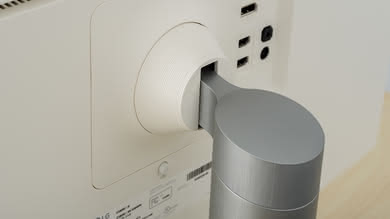
Update 01/20/2021: For consistency, we've changed the swivel adjustment from N/A to 'No'. The score remains unchanged.
Disappointing ergonomics. You can adjust its tilt, but since it can't swivel, you'll need to move the whole monitor. However, you can place it in portrait mode, but it only rotates clockwise, so that means the inputs will be on top, which isn't ideal if you have short wires for whatever you need to insert into the monitor. If you need a monitor that has better ergonomics, take a look at the Dell UltraSharp U2720Q.

The back of the monitor is very plain and there is only basic cable management through a ring attached to the main stand.
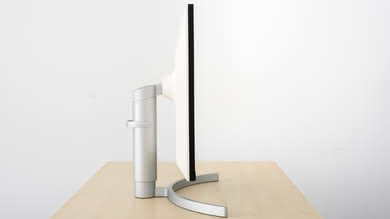
The monitor has an average thickness when it's on its stand. If you choose to VESA mount it, then it will look significantly thinner and won't protrude.

Note 01/07/2020: We've seen a few reports of increasing light bleed from the corners over time. Some people have seen this start even 1-2 years after receiving their unit. We haven't noticed this on ours.
The build quality is decent. There are no gaps and you shouldn't have any issues with this monitor. On the other hand, it's plastic and doesn't have a premium construction feel to it.
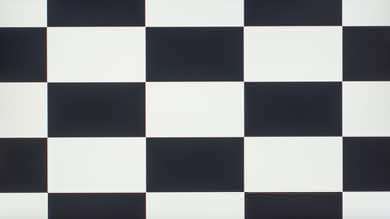
The contrast ratio is mediocre, as is the case with most IPS monitors. In darker rooms, blacks will appear gray. If you want a 4k monitor with better dark room performance, check out the Dell S3221QS.
The LG 27UK650-W doesn't have a local dimming feature. The video above is for reference only.
Great SDR peak brightness. The brightness is consistent across varied content and it can get bright enough to combat glare in most rooms.
Okay HDR peak brightness. It doesn't get bright enough to bring out highlights, but it remains fairly consistent across different content.

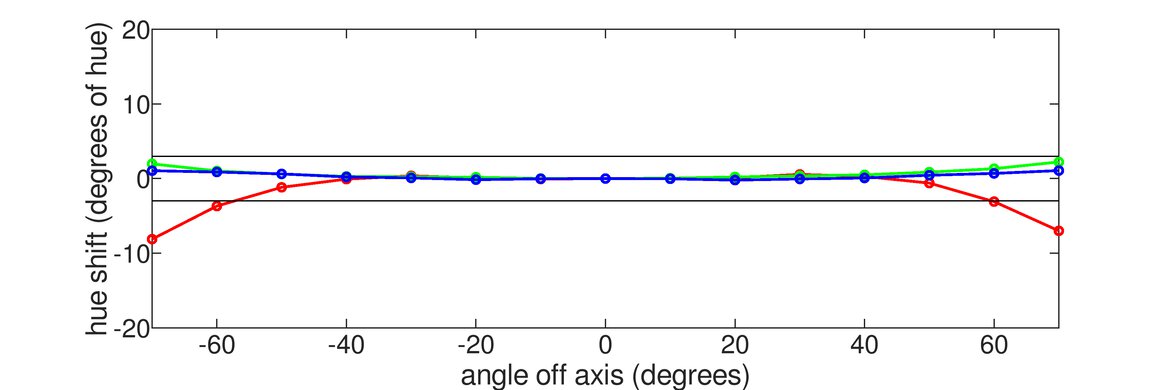

The horizontal viewing angles of the LG 27UK650-W are great. This is typical for IPS monitors, which is ideal for sharing your screen with others.



The vertical viewing angles of the LG 27UK650-W are good, very similar to Dell U2718Q. The edges of the screen might appear slightly darker if you sit close to the screen, but this shouldn't be a problem for most people.


Excellent gray uniformity for the LG 27UK650. There's very little dirty screen effect and you shouldn't notice any darkening when browsing websites with large white areas. The edges of the screen, however, are noticeably darker than the rest.

Note 01/07/2020: We've seen a few reports of increasing light bleed from the corners over time. Some people have seen this start even 1-2 years after receiving their unit. We haven't noticed this on ours.
The overall black uniformity of this monitor is mediocre. There's visible clouding across the screen.
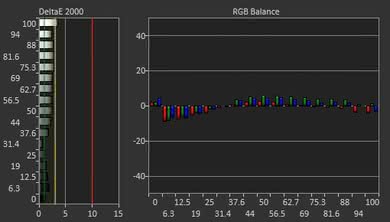
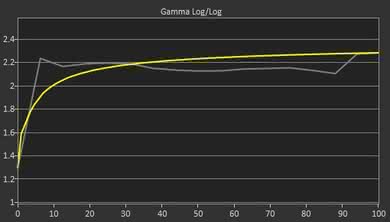

The 27UK650-W has very good out-of-the-box color accuracy. Most colors are fairly accurate, although the color temperature is colder than our target of 6500K, so colors may have a blue tint to them. The gamma curve follows the target well, but dark scenes will appear darker than they should, and bright scenes will be brighter.
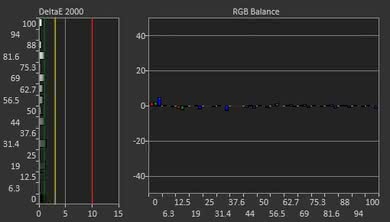
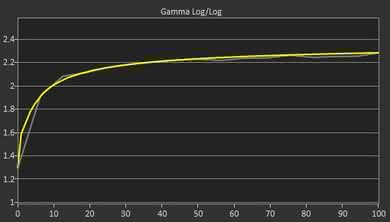

Outstanding post-calibration color accuracy. There are minimal inaccuracies in most colors and the color temperature is much closer to the target. The gamma curve follows the target almost perfectly, although some scenes may appear brighter than they should.
You can download our ICC profile calibration here. This is provided for reference only and should not be used, as the calibration values vary per individual unit even for the same model due to manufacturing tolerances.

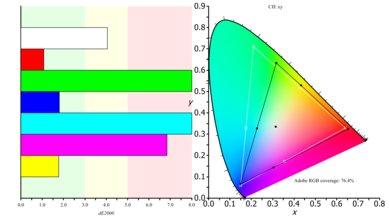
The color gamut of the LG 27UK650-W is excellent as it covers almost all of the common sRGB colorspace. On the other hand, photo editors might find the coverage of the Adobe RGB color space limiting for their standards.
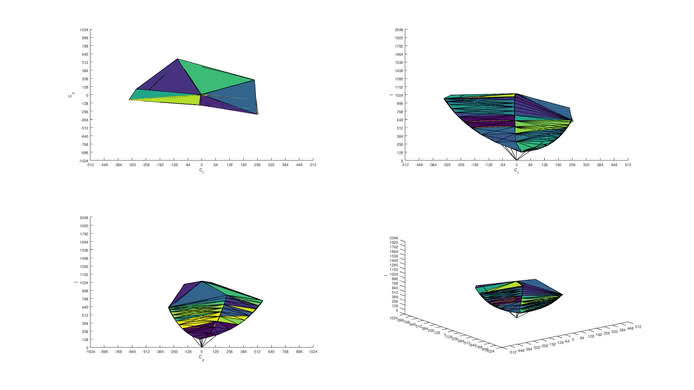
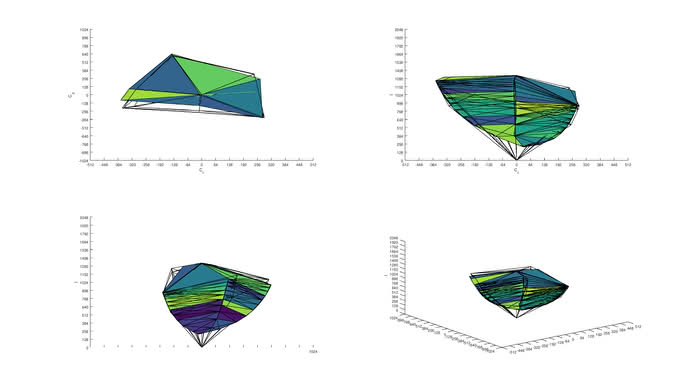
Excellent SDR color volume. It can display a wide range of shades, although it can't display darker shades due to the low contrast ratio. This might be an issue with those who want to use it for photo editing and need it to display colors across the entire brightness range.


The 27UK650-W fails to display a wide color gamut in HDR. It has good coverage of the DCI P3 color space used in most content, but it can't produce most colors in the wider Rec.2020 color space. If you want a similar monitor that can display a wide color gamut, check out the Dell S2721QS.
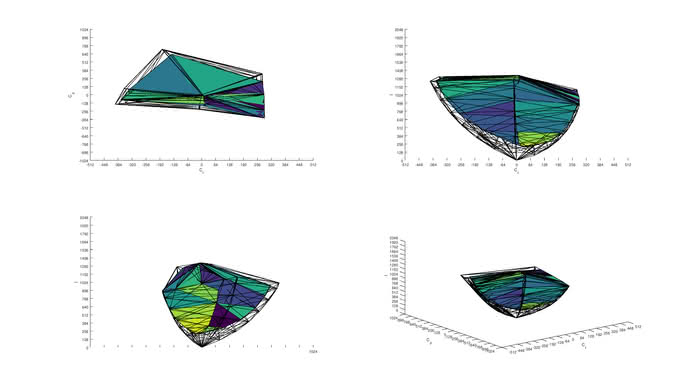
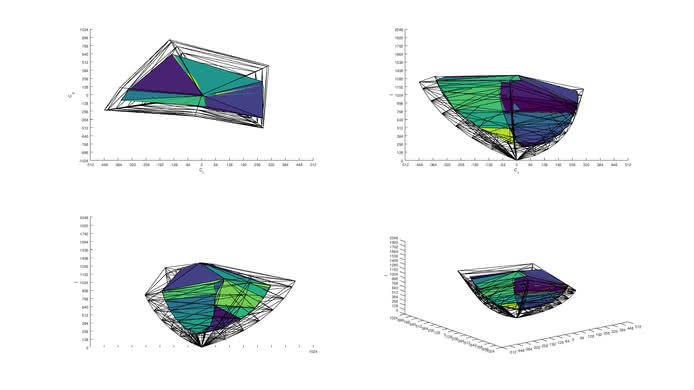
Disappointing HDR color volume. The monitor can't display a wide range of colors mostly due to the lack of a wide color gamut and a low contrast ratio.

Outstanding image retention performance. However, some slight signs of image retention are present immediately after the exposure of our test image. This is unlikely to be noticeable in most content.
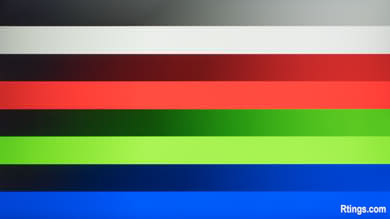
The LG 27UK650-W has an excellent gradient performance, and banding isn't visible.
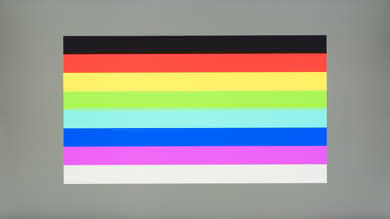
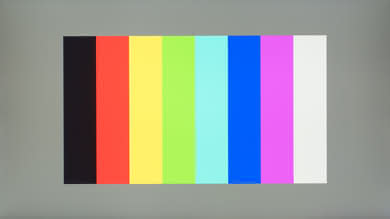
There's no visible sign of color bleed on the 27UK650-W.



The reflection handling is decent. The semi-gloss finish diffuses reflections across the screen, but it may be a problem in a bright room, as the entire screen glares.


The 4k resolution on this monitor produces clear text. Enabling ClearType (top photo) can make text easier to read.

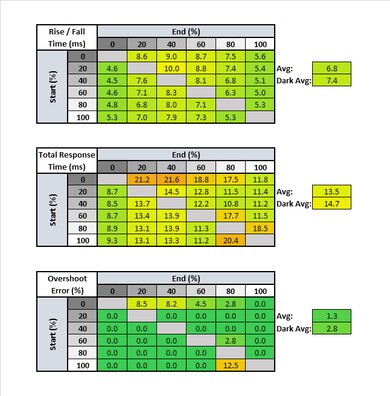
| Overdrive Setting | Response Time Chart | Response Time Tables | Motion Blur Photo |
| Off | Chart | Table | Photo |
| Normal | Chart | Table | Photo |
| Fast | Chart | Table | Photo |
| Faster | Chart | Table | Photo |
Very good response time on the 27UK650-W. Motion looks the most clear with the Response Time set to 'Normal.' There's a bit of overshoot in some darker transitions in this setting, but there's less overshoot than on the other settings, and it looks the clearest.



This monitor's backlight is flicker-free, which helps reduce eye strain.
We did notice some unusual behavior of this monitor. After testing the input lag, we noticed some significant panel flicker where our test patterns were situated. This flicker ghosting persisted for about 15 minutes after completing our test, but the issue went away more quickly when the monitor was displaying moving content as opposed to static content. You can see the flicker when displaying a 50% gray image here filmed with a high-speed camera.
It's only temporary and it's highly unlikely that most people will experience this during normal usage. We don't know if this flicker retention is caused by a defect in our unit, or if it's a built-in issue.
This monitor doesn't have a black frame insertion feature to help reduce motion blur.
The refresh rate of the 27UK650-W is okay. The 60Hz max refresh rate can go as low as 40Hz with FreeSync VRR technology, which might not be enough for some gamers. If you want a 4k monitor with a higher refresh rate, check out the LG 27GN950-B.
With NVIDIA's new FreeSync drivers, the 'Extended' mode didn't work properly, with constant tearing. However, the 'Basic' mode works perfectly and can be used up until 60Hz.
Note: HDR input lag was measured using the HDMI port unlike the other measurements, which used a DisplayPort connection.
Great low input lag on the LG 27UK650-W, particularly for a 60Hz monitor. The FreeSync input lag is roughly the same as the native refresh rate input lag, which is great.
The LG 27UK650-W has a very high 4k resolution and a large 27 inch size, which gives it incredible pixel density and detail while having plenty of screen space to work on.
Even though HDR support started with DP 1.4, HDR works over the DP 1.2 port.
To allow full HDMI 2.0 bandwidth, the HDMI Ultra HD Deep Color setting must be enabled.
The LG 27UK650-W has the same additional features found on other LG monitors:
- Super Resolution+: an upscaling function that tries to sharpen upscaled video.
- Black Stabilizer: an option to affect the gamma of dark shades while not affecting light shades.
- Automatic Standby: It turns the monitor off automatically after a period of no activity.

